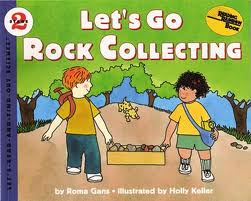Hello Science Friends,
I have to confess. I like rocks. I bet you do too. There was a time when teaching young children about rocks seemed less than fun. Maybe you have been there too. I decided a few years ago I had to take matters into my own hands because kids just like rocks! And now I don't just like rocks, I think I love rocks! With a little preparation and just a little effort, I bet you will love teaching rocks as much as I do. One of the biggest problems I faced was not having rocks in order to teach with. But the truth is that one of my most successful rock years was a unit centered around playground rocks.
I will admit you might have to get real close to see some of the differences in those rocks but they are there. If you challenge a Kinder kid to find interesting rocks they always do. And if you need some more rocks ask your kids to search at home too!
Rock collecting can be fun. It can also be an excuse to use a hand lens and get outside and investigate the natural world. And isn't that accomplishing on of those field investigation objectives at the same time? Isn't it sounding a lot easier already?
If you just can't find enough rocks while hopping through the fields investigating then I have the best kept secret for you. Dollar Tree has the best rocks in great big bags for a dollar each. And don't be fooled, there are some cool rocks in each bag. At most stores they carry three different types of rocks. You are going to want one of each bag. Yep, they are that good.
Three bags will get you a good amount of rocks and probably get you through some serious rock investigations. You may even find a tiger striped one like we did. If so, just expect it will be a popular rock.
Now if you are getting excited about rocks and you feel like reading Everybody Needs A Rock just go with it. And then you might realize that you are feeling so generous that everybody really needs their own rock...just one more bag of rocks will do! You know you can't read it without giving a special rock! You see, rocks are starting to be kind of fun. I told you.
If you are like me then now you are probably going to want to pick up this rock alphabet book. Ahhh, some integration don't we just love it? Rocks are fun. And if you get this book, I swear you will start thinking of making a rock alphabet with a cool silver Sharpie and yet another bag of rocks! Are you going to make an uppercase set without a lowercase set? I bet not. I wouldn't either. Oh my, what about numbers too? What the heck, just about three more bags of rocks and you are now gearing up for some real science fun investigating rocks!
You know once you get into it the kids are going to ask for just one more rock book! Under One Rock is the answer. I bet your library will have all of these for your great rock explorations. And who would want to have a rock unit without some great books?
Even
Martha Stewart knows rocks are cool. Don't you love the letter rocks? I want to get my hands on those now...
So what do kinder kids really look like when investigating rocks? I get that question a lot. Well, I will tell you they are quiet and both hands are busy with a hand lens and a rock! They like to look close and see every little detail and they get good at it. And they get good at describing rocks by their properties.
And when I see and hear Kinder kids observing, describing and recording the properties of a rock, it makes me want to smile a big nature loving girl smile. It was worth all those trips to the store for more rocks and all those rock hopping trips through nature for those special rocks because they are... developing young scientists.

Ok, so where is the Science? The Science is in the ability to describe the properties of an object and our object is a rock! Now this can take some serious work on your part. At first, this is difficult for young children and second language learners and that is why we created this anchor chart. We use it to help us remember how we can describe a rock. It looks simple but this is one of the best teaching tools. And you will be amazed that children begin to do this naturally. I am serious. But the trick is multiple hands-on investigations and after each investigation we follow up with a Scientist meeting. These meetings give us a chance to hear each other describe the properties of a rock and it gives all of us a chance to use these descriptions.
Not the best picture I will admit but this is an example of what we knew just after two investigations. Now you see how exciting rocks can really be!
Feel free to grab your Rock Parent Letter and Describing Properties of an Object poster and get started investigating. I think that the rock bag total was about seven bags if you want to do everything mentioned here. So that is about seven bucks of rock fun!
If you previously purchased my Developing Young Scientists Rock Unit please look for your notification for the new download. Have fun investigating the natural world!


































.JPG)























































